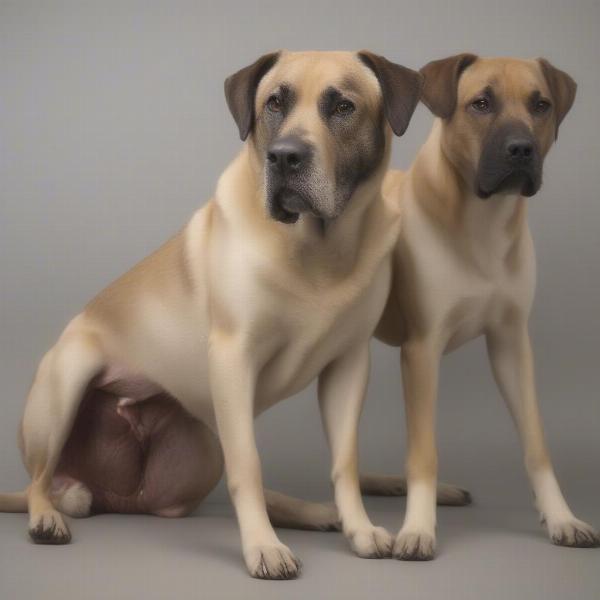A swollen hock in a dog can be alarming, and it’s essential to understand the potential causes and appropriate treatments. This comprehensive guide will cover everything you need to know about swollen hocks in dogs, from identifying the symptoms to understanding treatment options and preventive measures. “Dog hock swollen” is a common search term for worried pet owners, and this article aims to provide the information you need.
Understanding the Dog Hock
The hock is equivalent to a human’s ankle, located on a dog’s hind leg between the paw and the knee. It’s a complex joint crucial for mobility and susceptible to various injuries and conditions. Recognizing the signs of a swollen hock, like limping, pain, and visible swelling, is the first step towards ensuring your dog receives the necessary care.
Common Causes of Swollen Hock in Dogs
Several factors can contribute to a dog hock swollen, including:
- Injuries: Sprains, strains, and fractures are common, especially in active dogs. These can occur during vigorous play, falls, or even awkward landings.
- Arthritis: Osteoarthritis and rheumatoid arthritis can cause inflammation and swelling in the hock joint.
- Infections: Bacterial infections can lead to swelling, pain, and redness in the affected area.
- Allergies: In some cases, allergies can manifest as swelling in the hock, often accompanied by itching and redness.
- Hygroma: This fluid-filled swelling typically develops over bony prominences like the hock, often due to repeated trauma or pressure.
- Tumors: While less common, tumors can also cause swelling in the dog’s hock.
 Swollen Dog Hock Comparison
Swollen Dog Hock Comparison
Diagnosing a Swollen Hock
If you notice your dog swollen hock joint, it’s crucial to consult a veterinarian. They’ll conduct a thorough physical examination and may recommend further tests like X-rays, blood work, or joint fluid analysis to pinpoint the exact cause.
What will the vet ask me about my dog’s swollen hock?
Your vet might ask about your dog’s recent activity, any noticeable injuries, changes in behavior, and overall health history. Providing detailed information can help them reach an accurate diagnosis.
Treatment Options for a Dog Hock Swollen
Treatment varies depending on the underlying cause of the swelling. It might involve:
- Rest and Immobilization: Rest is crucial for healing most hock injuries. Your vet may recommend restricting your dog’s activity and using a brace or splint to immobilize the joint.
- Medications: Pain relievers, anti-inflammatory drugs, antibiotics, or allergy medications may be prescribed to manage pain, reduce swelling, and address underlying infections or allergies.
- Physical Therapy: Targeted exercises and therapies can help improve joint mobility and strength after an injury or surgery.
- Surgery: In severe cases, such as fractures or severe ligament damage, surgical intervention might be necessary.
Preventing Swollen Hocks in Dogs
While not all causes are preventable, you can take steps to reduce the risk of swollen hock dog:
- Maintain a Healthy Weight: Excess weight puts extra strain on joints, increasing the risk of injury and arthritis.
- Provide Regular Exercise: Moderate, low-impact exercise helps keep joints healthy and strong.
- Use Joint Supplements: Supplements containing glucosamine and chondroitin can support joint health and slow the progression of arthritis.
- Provide Supportive Bedding: A comfortable, supportive bed, especially a round large dog bed, can help cushion the joints and reduce pressure on the hock.
Conclusion
A swollen hock in dogs can signify various underlying issues, requiring prompt veterinary attention. Early diagnosis and appropriate treatment are crucial for managing the condition effectively and ensuring your dog’s comfort and mobility. By understanding the causes, treatment options, and preventive measures, you can help keep your furry friend’s hocks healthy and pain-free.
FAQ
- How can I tell if my dog’s hock is swollen? Look for signs of limping, pain, difficulty walking, visible swelling, and warmth around the joint.
- Is a swollen hock a serious problem? It can be, depending on the cause. Always consult a veterinarian for diagnosis and treatment.
- Can a dog recover from a swollen hock? Yes, with proper treatment and management, many dogs recover fully.
- How long does it take for a swollen hock to heal? Recovery time varies depending on the cause and severity of the swelling.
- What can I do to prevent my dog’s hock from swelling? Maintain a healthy weight, provide regular exercise, consider joint supplements, and ensure a comfortable bed.
- When should I seek emergency veterinary care for a swollen hock? If your dog is in severe pain, unable to bear weight, or the swelling is sudden and severe, seek immediate veterinary care.
- Are certain breeds more prone to swollen hocks? Yes, larger breeds and those genetically predisposed to joint issues are at higher risk.
ILM Dog is a leading online resource for dog owners worldwide, providing expert advice on dog breeds, health, training, nutrition, grooming, and more. We are dedicated to helping you provide the best possible care for your canine companion. We offer a range of resources and information to support your journey as a dog owner. Whether you’re looking for advice on choosing the right breed or understanding the latest in canine health, ILM Dog is here to help. For further assistance, contact us via email at [email protected] or phone at +44 20-3965-8624. ILM Dog is your trusted partner in dog care.